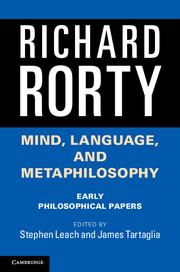Book contents
- Frontmatter
- Contents
- Foreword
- Acknowledgments
- Introduction
- 1 Pragmatism, categories, and language
- 2 The limits of reductionism
- 3 Realism, categories, and the “linguistic turn”
- 4 The subjectivist principle and the linguistic turn
- 5 Empiricism, extensionalism, and reductionism
- 6 Mind-body identity, privacy, and categories
- 7 Do analysts and metaphysicians disagree?
- 8 Incorrigibility as the mark of the mental
- 9 Wittgenstein, privileged access, and incommunicability
- 10 In defense of eliminative materialism
- 11 Cartesian epistemology and changes in ontology
- 12 Strawson’s objectivity argument
- 13 Verificationism and transcendental arguments
- 14 Indeterminacy of translation and of truth
- 15 Dennett on awareness
- 16 Functionalism, machines, and incorrigibility
- Index of names
- References
2 - The limits of reductionism
Published online by Cambridge University Press: 05 June 2014
- Frontmatter
- Contents
- Foreword
- Acknowledgments
- Introduction
- 1 Pragmatism, categories, and language
- 2 The limits of reductionism
- 3 Realism, categories, and the “linguistic turn”
- 4 The subjectivist principle and the linguistic turn
- 5 Empiricism, extensionalism, and reductionism
- 6 Mind-body identity, privacy, and categories
- 7 Do analysts and metaphysicians disagree?
- 8 Incorrigibility as the mark of the mental
- 9 Wittgenstein, privileged access, and incommunicability
- 10 In defense of eliminative materialism
- 11 Cartesian epistemology and changes in ontology
- 12 Strawson’s objectivity argument
- 13 Verificationism and transcendental arguments
- 14 Indeterminacy of translation and of truth
- 15 Dennett on awareness
- 16 Functionalism, machines, and incorrigibility
- Index of names
- References
Summary
One criticism which philosophers often make of their opponents is that they are “reductionists.” One gathers that a typical philosophic error is to infer from “X has the property Y” to “X is nothing but Y,” or to infer from “X is analogous to Y in respect to Z” that “X and Y are indistinguishable.” Another form of the same criticism is that philosophers take some feature of experience or reality or language to be paradigmatic, and are not then able to account for features which depart from this paradigm. Yet no such criticism can, without absurdity, object to the general procedure which these inferences illustrate. All rational inquiry is reductionist; all abstract thought takes selected aspects of a subject-matter as paradigmatic and ignores other aspects. Thought is reductionist or nothing, and the criticism only makes sense if it is narrowed down. When it is narrowed down, it usually turns out to be the claim that a reduction of X to Y is illegitimate because the very process of reducing presupposes some X that is not reduced. This claim, which we shall call “the appeal to self-referential consistency,” is the topic of this chapter. Our aim is to see what can be done to specify a point of diminishing returns in the reductive process, and thus to locate the limits of reductionism.
Information
- Type
- Chapter
- Information
- Mind, Language, and MetaphilosophyEarly Philosophical Papers, pp. 39 - 54Publisher: Cambridge University PressPrint publication year: 2014
References
Accessibility standard: Unknown
Why this information is here
This section outlines the accessibility features of this content - including support for screen readers, full keyboard navigation and high-contrast display options. This may not be relevant for you.Accessibility Information
- 2
- Cited by
